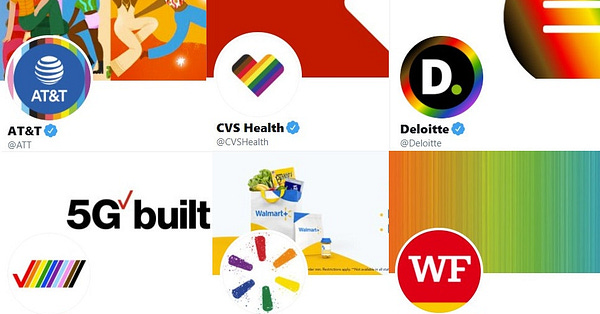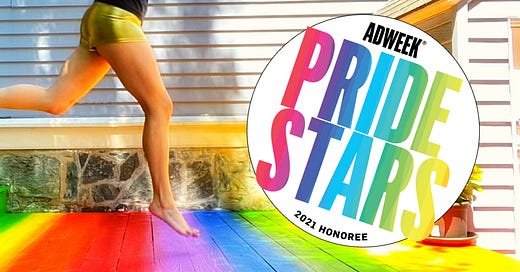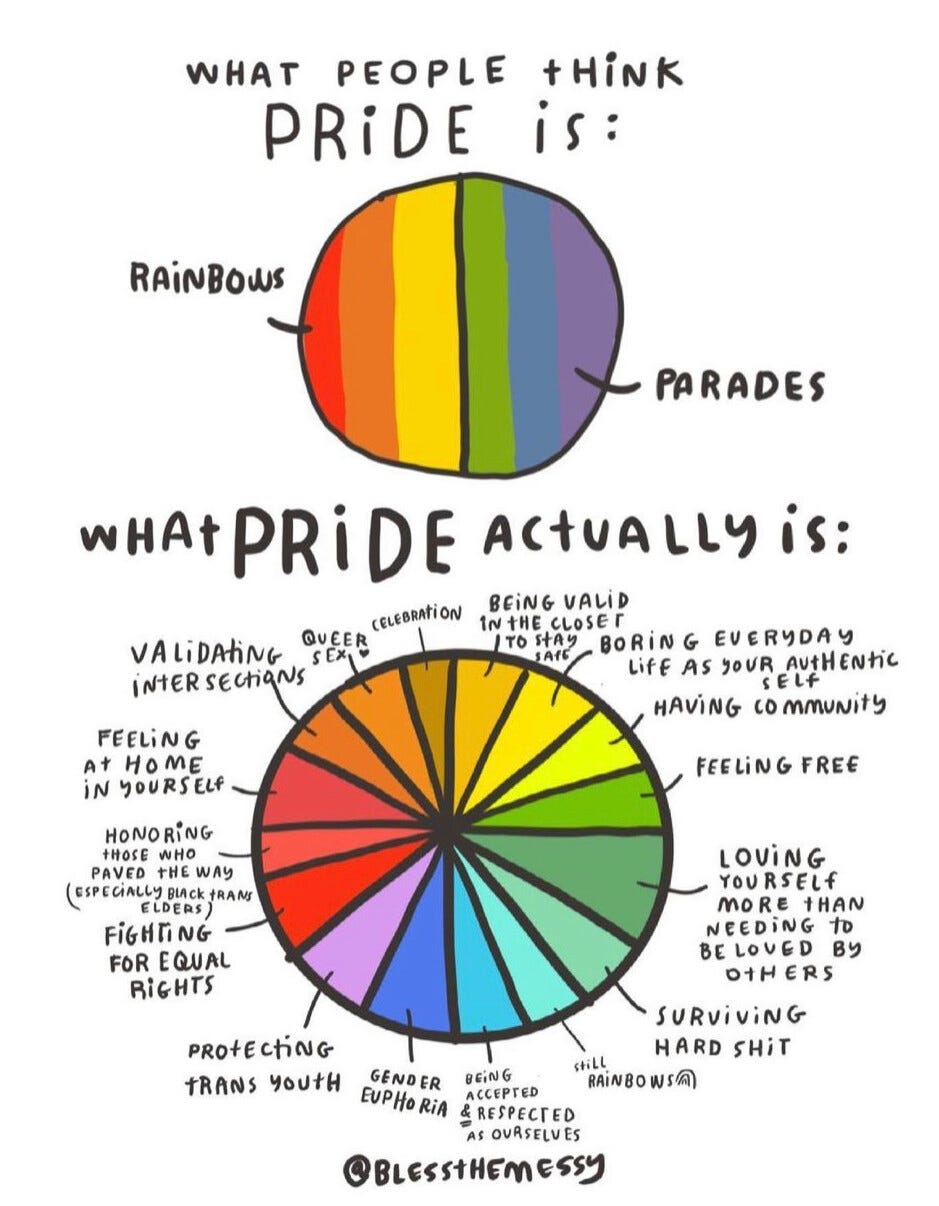#155: You're a Star, Baby + Five Truths About 2021 Pride Marketing
Plus a reminder to tune in tomorrow night...!
Reminder to join me tomorrow night as I host the 2021 Adobe Experience Maker Awards! 5pm PT / 8pm ET live on LinkedIn.
#155: Special edition
Well this is cool.
I’ve been named to the 2021 class of Adweek Pride Stars, alongside an absolutely star-studded list of LGBTQ+ leaders across media, marketing, and tech.
(Seriously. It’s in alphabetical order so I’m listed after… Dan Levy. Cool cool cool.)
Thanks to Adweek for highlighting members of the community who are doing big things. It’s an honor to be among them.
Risks of Performative Pride Allyship
I have a new byline in this edition (in print as well if you see it in stores), “5 Risks of Performative Pride Allyship for Brands to Keep in Mind This June.”
An excerpt:
Earlier this month, I woke to find our community caught up in the great chicken sandwich war again as Burger King and Chick-fil-A continue to battle for poultry sandwich market dominance.
Chick-fil-A’s CEO, who has a history of opposing same-sex marriage, was revealed to be funding an ongoing effort to oppose The Equality Act, a bill that would prevent discrimination for LGBTQ+ individuals. Sensing an opportunity to news-jack during Pride month, Burger King tweeted it would donate up to $250,000 to the Human Rights Campaign for every one of their sandwiches sold during June.
The communications professional within me applauded the timely and clever response from a brand with a history of news-jacking success.
But as a member of the LGBTQ+ community, I can’t help but feel like a pawn in an unnecessary debate over which chicken sandwich is more woke, especially regarding a social movement that directly impacts my marriage, employment and protection under the law.
Read the full piece in Adweek.
2021 Pride Marketing’s Hard Truths
You know me. I couldn’t keep my thoughts about pride marketing to 800 words. Read my longer (and ungated) NEW piece following 2019’s Pride or Pander featuring 5 truths about what I’m noticing this year.
Truth 1: There is more rainbow-washing than ever.
Some examples from 2021 include:
Chipotle’s partnerships with notable drag influencers (like the Trixie Mattel Pride Burrito).
Microsoft’s programming and retro pride desktop downloads.
Mattel’s UNO Play with Pride edition.
Best Buy’s collection of products and stories of “how tech helps the LGBTQIA+ community find, protect and celebrate each other.”
Even LEGO is proud this year with their Everyone is Awesome set:
Truth 2: There are more calls for action, and more awareness of pride pandering.
Judd Legum points out that 25 major companies presenting themselves as champions of LGBTQ rights via rainbow logos or pride parade sponsorship have donated more than $10M to anti-LGTBQ politicians in just the last two years.


The HRC Corporate Equality Index (CEI) criteria does not factor in these types of donations, making it easy for brands seeking to co-opt the pride movement to boast a CEI score of 100 while still making corporate donations to anti-LGBTQ politicians.
What’s more, I’m seeing an uptick in memes calling out brands for their performative alignment with this particular minority-of-the-month.
Some of my favorites:
(PS I love these please send them to me!)
Truth 3: There is more need for transgender empathy.
The LGBTQ+ community is not a monolith. Each letter of that acronym does its best to encapsulate the experiences of a subset of the community, but the truth is, each of us brings a completely unique identity.
The “T” represents transgender individuals, those whose gender identity is different from the gender they were thought to be at birth.
Gender is so ingrained into our understanding of the world that many never stop to question the rigid dichotomy prescribed and reinforced by cultural norms.
So, for our friends and colleagues who don’t fall into the limited way our (very modern) culture has categorized humans, their experience in the workplace and beyond is often unfair and unsafe.
Consider:
90% of transgender individuals said they experience harassment or mistreatment at work or feel forced to take protective actions that negatively impacted their careers or their well-being, such as hiding who they were, in order to avoid workplace repercussions.
2021 is the worst year on record for anti-trans bills in America.
Only 18% of advertisers and 28% of agencies agree that featuring transgender people and scenarios is supported by top management (P&G / GLAAD).
The good news: HRC’s 2021 Corporate Equality Index points out that the number of CEI participating companies who offer transgender-inclusive health insurance coverage has increased 22 times since 2009.
Resources to support our transgender friends and colleagues:
How to They/Them, A Visual Guide to Nonbinary Pronouns and the World of Gender Fluidity by Stuart Getty
theyTHEM, a little film about a big pronoun
Gender Ambiguity in the Workplace, Alison Ash Fogarty, PhD and Lily Zheng
Trans Toolkit for Employers, Human Rights Campaign Foundation
“Binary gender terms (a.k.a. man and woman) are too limiting for the myriad identities people want to express. Language has evolved to meet the needs of people. They is how some people feel seen as beyond the gender identities of man and woman. They is a gender-free pronoun.” - Stuart Getty
Truth 4: There are more allies and more resources to help.
Whenever I speak to marketers (and I get to do that a lot lately!) I hear the same refrain:
"I just want to do the right thing."
Callie Schweitzer, Senior Marketing Editor at LinkedIn News recently published a thoughtful and insightful piece on this topic that I was proud to weigh in on, “Marketing still has an LGBTQ inclusion problem — how do we solve it?”
She’s part of a growing number of changemakers who are shining a light on this issue and creating resources to help our society’s gatekeepers - those who control access to influence, employment, and more - better understand the needs of the LGBTQ+ community.
One resource in particular I want to highlight comes from Getty Images. The LGBTQ+ Image Guidebook is a helpful guide to improve representation of this community.
Global respondents surveyed for Getty Images’s Visual GPS said that only 21% of people globally see LGBTQ+ people represented regularly, and when they do, the representations remain narrow and stereotypical.
Roughly a third of the visuals they do see of the LGBTQ community depict gay men as “feminine” and lesbian women as “masculine.”
Pause for eye roll.
Another great study comes from IBM and Out & Equal / Workplace Pride, finding that LGBT+ professionals in the US experience enduring discrimination - and broader inclusion - in the workplace.
Truth 5: There is more arrogance about the role of advertising.
As my hero Jean Kilbourne preaches, advertising creates “normalcy.”
Yes, representation matters.
It's why I'm OK with the risks of being outed to an entire industry with this Adweek Pride Stars inclusion. Seeing others live authentically matters to someone who cannot - and if that someone is you, I hope you know you are loved. You're OK.
Getty Images says:
“As LGBTQ+ visibility increases, so does empathy and tolerance. Inclusion across marketing and advertising narratives helps society move beyond stereotypes.”
But here's where I am feeling some unease...
In its new Visibility Project study on advertiser and agency perspectives on LGBTQ inclusion, GLAAD teamed up with the world’s largest advertiser, P&G, to make sure we know how important advertising is to the growing acceptance of this community.
It reads like a pat-on-the-back.
As I looked through the findings, I couldn’t help but ask… what is P&G’s motivation here? Is this an attempt to take some credit for the gains made in LGBTQ+ equality?
I understand that the point of the study is to encourage more representation in advertising for this community. That’s a good thing, and as the study points out, there’s lots of ground to make up in bisexual and transgender representation in ads.
But we cannot lose sight of what has really driven the very recent gains in marriage equality, workplace protections, and the record-high public support (70% in the US now support same-sex marriage.)
Our rights are due to a long history of activists, grassroots organizers, demonstrations like Stonewall and legislative action championed before it was safe, popular, and profitable. Pride has always been about resistance, not assimilation. How can agencies, or P&G, be the allies of a community that has been shut out of basic equality in our country?
The ad industry is a self-aggrandizing one... (Cannes is just around the corner!)
And while I have a ton of respect for the power of this field, the science and creativity that goes into it, and the people who work hard to win those coveted trophies... as social movements and marketing collide, I fear we as an industry are giving too much credit to ourselves.
LGBTQ+ people have always existed. We are putting too much of a spotlight on the marketers and agencies who chose to include us in their ads once it became profitable to do so, instead of the communities and the human beings that the movement is intended to protect - and who need continued allyship.
Let’s celebrate representation.
But, credit should not be co-opted by advertisers.
Not now.
The road ahead is clear. We need more than advertising, we need more than rainbow logos, and as always, we need to remember who this is about in the first place.You want credit for being an ally? Including us in an ad is not brave, not anymore.
Woke-washing shields the real ways these organizations can foster change.
Showing up for the community involves understanding the challenges at hand... lobbying efforts, internal hiring and culture, supplier diversity, representation the rest of the year, inclusion in an intersectional way across our big beautiful rainbow spectrum, and leveraging a brand's power in states that are actively seeking to harm the community today.
As I say in my Adweek piece we must “center the experiences and needs of real LGBTQ+ humans… marketers need to remember what the movement is about.”
Otherwise, this is nothing more than more performative allyship.
----
Some personal news!
I’m proud to have joined the board of Pride in Our Workplace, a nonprofit helping LGBTQ+ professionals and allied businesses to drive positive change in the workplace.
Sending good vibes,
Katie Martell
Twitter | LinkedIn | Website









